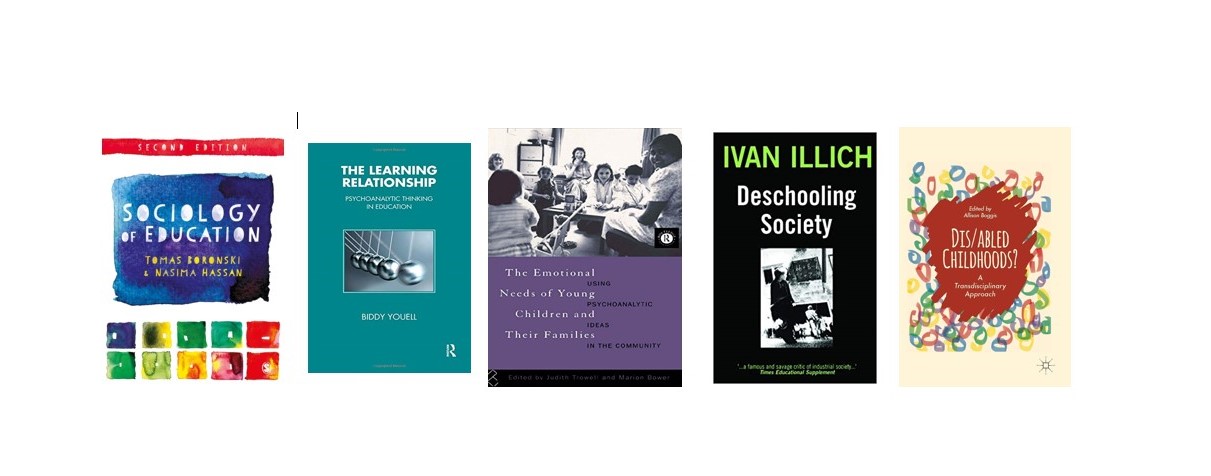
The central concern for this module is an understanding of what facilitates learning and what gets in the way of learning. Learning is evident both in the nursery and the classroom in a highly structured way, but its origins for each of us can be traced back to the earliest relationships and experiences with our parents or carers and the way these were made available to us within an environment in which we felt safe enough to be playful, curious and open to new experience. This module builds upon the knowledge and skills students have gained in the Autumn Term studying therapeutic groups.
We will examine a number of factors in order to understand the nature of learning, for example, the capacity to face anxiety, to manage transitions, to cope with new experiences and relationships with adults and peers. We will consider the meaning of children’s behaviour, the contribution attachment theory can make to the classroom and identify the forces at work leading to exclusion of some children. We will also ask what qualities and capacities do teachers and learning support staff need to create effective learning environments? These questions should be informed by the sociological, constructionist and psycho-social perspectives explored in years one and two.
Finally, how can this understanding be translated into practice in order to provide effective learning environments in which children are full participants in the learning and parent partnership has a meaningful influence upon dynamics involved in learning? To this end, you will be engaged in planning and producing learning activities which will be evaluated by teachers and others responsible for delivering curricula to children.
Aims
• To recognise the complex factors involved in learning from sociological, constructionist and psychosocial perspectives
• To develop an understanding of issues which affect teaching, such as professional identity, anxiety, power and social influence
• To consider the research and theory surrounding inclusion and exclusion in educational settings
• To engage with the practical and professional issues involved with planning learning activities
• To reflect upon experiences students have had on placement and use this to consider the characteristics of a good structured learning plan
Learning Outcomes
• Students will gain an understanding of sociological, constructionist and psycho-social perspectives which have been applied to issues around children’s learning
• Students will gain an understanding of attachment theory and its relevance to learning
• Students will be able to better understand children’s / pupil’s behaviour and its underlying meaning
• Students will gain an understanding of the causes of exclusion and the methods used to reduce this
• Students will be better able to plan structured learning activities for the nursery or classroom setting
We will examine a number of factors in order to understand the nature of learning, for example, the capacity to face anxiety, to manage transitions, to cope with new experiences and relationships with adults and peers. We will consider the meaning of children’s behaviour, the contribution attachment theory can make to the classroom and identify the forces at work leading to exclusion of some children. We will also ask what qualities and capacities do teachers and learning support staff need to create effective learning environments? These questions should be informed by the sociological, constructionist and psycho-social perspectives explored in years one and two.
Finally, how can this understanding be translated into practice in order to provide effective learning environments in which children are full participants in the learning and parent partnership has a meaningful influence upon dynamics involved in learning? To this end, you will be engaged in planning and producing learning activities which will be evaluated by teachers and others responsible for delivering curricula to children.
Aims
• To recognise the complex factors involved in learning from sociological, constructionist and psychosocial perspectives
• To develop an understanding of issues which affect teaching, such as professional identity, anxiety, power and social influence
• To consider the research and theory surrounding inclusion and exclusion in educational settings
• To engage with the practical and professional issues involved with planning learning activities
• To reflect upon experiences students have had on placement and use this to consider the characteristics of a good structured learning plan
Learning Outcomes
• Students will gain an understanding of sociological, constructionist and psycho-social perspectives which have been applied to issues around children’s learning
• Students will gain an understanding of attachment theory and its relevance to learning
• Students will be able to better understand children’s / pupil’s behaviour and its underlying meaning
• Students will gain an understanding of the causes of exclusion and the methods used to reduce this
• Students will be better able to plan structured learning activities for the nursery or classroom setting
- Module Supervisor: Ebenezer Cudjoe
- Module Supervisor: Katharina Rowold